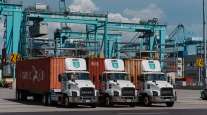Managing Editor, Features and Multimedia
McLeod Expands AI, Driver Choice in Time of Transformational Change

[Stay on top of transportation news: Get TTNews in your inbox.]
DENVER — Harnessing artificial intelligence and enabling more driver input are among the ways McLeod Software is participating in what CEO Tom McLeod described as a time of transformational change for the trucking industry.
“The tectonic plates that we all rest on are shifting around,” McLeod said, citing changing freight patterns, the proliferation of sensors and safety systems on modern trucks, and explosive growth in information technology.
This rapid pace of change, along with rising shipper expectations, is putting pressure on transportation companies to improve their operations, but that challenge also can be an opportunity to gain an advantage in the marketplace.

A view of the exhibit hall at McLeod Software’s 2019 user conference in Denver. (Seth Clevenger/Transport Topics)
“Change can mean growth and opportunity for your business, if you’re prepared,” McLeod said here Aug. 26 at the software firm’s 2019 user conference.
To help its customers adapt to the increasingly demanding business environment, the company is leveraging artificial intelligence and machine learning to enhance its LoadMaster and PowerBroker transportation management systems.
McLeod pointed to two main areas where the company has been applying AI: pricing decisions and putting the right truck on the right load at the right time.
Many transportation companies already capture an abundance of data on their operations and freight networks, but the real challenge is interpreting that information in a way that supports better business decisions. The software company offers its McLeod IQ business intelligence platform to enable carriers and brokers to analyze their own data in customized dashboards.
To expand its AI-enabled decision support, McLeod is beginning to roll out Top Order, a feature designed to help carriers make smarter choices on which loads to accept. The new software tool rates loads on a 5-star scale based on their profitability and shows the pricing that would be necessary to turn a 2-star load into a 3-star load, for example.
“This real-time information can help you make better, more profitable decisions,” McLeod said.
McLeod also is enhancing its digital freight matching software with Top Match, a new feature that provides more decision support for brokers as they select the best carrier for a particular load.
Our lunch speaker, ATA Chief Economist Bob Costello is discussing current economic trends. #UC2019 #TransformingTrucking pic.twitter.com/gb8Q3IZw4W — McLeod Software (@McLeodSoftware) August 26, 2019
Other areas where the use of data and AI will improve business operations include hiring decisions and identifying which drivers may be about to leave the company, McLeod said.
Another broad change in the trucking industry is a growing focus on improving the driver experience as fleets struggle to attract drivers and reduce turnover.
“From a competitive standpoint, whoever’s able to recruit and retain the drivers is going to win in today’s marketplace,” McLeod said.
Earlier this year, McLeod introduced the Driver Choice module in LoadMaster, which lets drivers provide input on their load assignments and set preferences for where they’d like to drive, as well as factors such as length of haul, maximum empty miles and minimum revenue.
“In our experience, drivers love that — having some input and choice,” McLeod said, adding that the feature is particularly well-suited to owner-operator fleets.
The company also announced several joint development efforts, including a new Trip Management feature offered through an integration with Trimble Maps, formerly known as ALK Technologies.
The product monitors real-time traffic and weather events and sends proactive notifications when the truck is out of route. That information is particularly valuable for sensitive shipments that require tight delivery windows and precise estimates for time of arrival, McLeod said.
These new software developments come at a time when the freight market faces more uncertainty than a year ago.
McLeod reflected on 2018 as a historically great year with “all the freight everybody could handle,” along with rising freight rates and driver pay.

In our third episode of RoadSigns, we ask: How does AI change trucking's back office? Hear a snippet from host Seth Clevenger, above, and get the full program by going to RoadSigns.TTNews.com.
“From my observation, it was a year unlike any other — unprecedented in the trucking and transportation industry,” he said.
This year, however, earnings reports from publicly traded companies have been mixed, McLeod noted.
Nevertheless, the U.S. economy continues to grow, albeit at a slower pace, said Bob Costello, chief economist at American Trucking Associations.
“We are in the longest economic expansion in our country’s history, and there is no reason why it can’t keep going,” Costello said during remarks at the conference.
There are risks, though. If the ongoing trade battle between the U.S. and China escalates with more and higher tariffs, “it can absolutely push us into a recession,” he added.
Whatever the future may hold for the freight market, advances in data analytics will help transportation providers make better business decisions, said Ken Craig, vice president of special projects at McLeod.
The application of machine learning — which enables software to improve on its own through experience — is paving the way for a more prescriptive form of analytics, he said. Increasingly, software will provide recommendations on questions such as whether to accept a certain load.
“I call what we’re doing ‘Watson for trucking,’ ” Craig said, referring to IBM’s well-known question-answering computer program.



